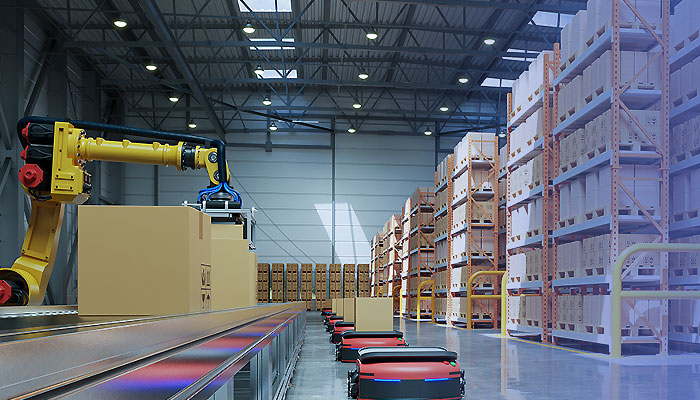Editors’ Picks





Robotics, AI, and data intelligence company Dexory recently announced it has successfully closed an $80 million Series B funding round. The round was led by DTCP, with participation from Latitude Ventures, Wave-X and Bootstrap Europe, along with existing investors Atomico, Lakestar, Capnamic and several participants from the logistics industry. As part of this investment, DTCP growth equity partner Michael Rager joined Dexory’s board of directors. “We are very impressed by the progress Dexory has made in transforming warehouse operations,” Rager said. “The company is perfectly positioned at the intersection of our investment thesis on digitisation and automation. Its ability to…

Amazon officials were joined by state and local elected representatives to celebrate the construction of its new, state-of-the-art robotics fulfillment center in the Town of Niagara, N.Y. The facility will be home to 1,000 local Amazon employees who will operate and work with the company’s newest robotics technology, delivering for customers in Western New York and beyond. The fulfillment center will expand Amazon’s operations and logistics network in New York, where there are more than 47,000 full- and part-time employees across the state. New robotics facility is the fourth in New York The five-story, 3.1-million-square-foot robotics fulfillment center is currently…

Milvus Robotics
Design-and-engineering

RUMFORD, R.I. - German-based motion plastics provider igus celebrated the opening of its new and expanded North American facilities on October 2, adding over 20,000 square feet of injection molding warehouse space to its Rumford, R.I. headquarters. The opening featured tours of the new injection molding facility - the company’s first outside of Germany - its expanded robotics campus and North American headquarters, containing the company’s warehouse for shipping and receiving. Injection molding facility has further room to grow At the opening, igus CEO Felix Brockmeyer welcomed guests to the campus, highlighting the company’s growth in the Providence suburb. The…

Warehouse technology and intralogistics software provider Mecalux recently deployed a pallet monorail at PepsiCo’s warehouse in Środa Śląska, Poland, making it the global food and beverage provider’s first automated warehouse in the country. PepsiCo has operated along the Vistula River since the 1970s, opening its first factory in Michrów in 1991. With 9,000 locations for finished products, this space is part of the Środa Śląska factory. The sustainable facility is responsible for distributing thousands of pallets of potatoes every day. The facilities - which cover an area the size of seven soccer fields - produce bags of potato chips and…

Universal Robots, the Danish collaborative robot (cobot) company, announced it has increased the payload on two of its cobots. Two UR new-generation, high-payload cobots, the UR20 and UR30, have received more payload capabilities, enabling customers to lift more at no additional cost. Software updates will trigger increased cobot payload The updates raise the total payload for the UR20 and UR30, including end-effector, to 25 and 35 kgs respectively when utilizing the cobot in top lift position. Universal Robots says this is especially useful for palletizing applications. “At Universal Robots, we continuously test and develop our products, and when we unlock…
End-user

ABB Robotics recently launched Ultra Accuracy, a new feature for its GoFa collaborative robot (cobot) arm family. The feature can deliver a path accuracy of 0.03 millimeters, which the company said can support manufacturing production in the electronics, automotive, aerospace, and metalwork fabrication industries. The Ultra Accuracy feature is available for both new GoFa systems and as a retrofit option for existing GoFa cobots. “As industries look to automation to enhance product quality and achieve tighter tolerances - continuously decreasing the maximum allowable deviation from the standard in quality control - there is a growing need for robots that can…

German-based motion plastics company igus has supplied its E2.10 series of e-chain plastic cable carriers as part of JEEVES, an autonomous robot from Robotise Technologies, that can autonomously navigate its environment and replace up to 300 hotel room minibars. JEEVES can be deployed at hotels, trade shows, canteens, offices, airports and more. Plastic cables enable high performance Constructed from high-performance plastics, the igus cable carriers are critical to the robot's performance, guiding the system's energy and data cables. Units can resist wear and abrasion and are suitable for a wide temperature range. The cables are installed above the guide rails…

FRAMINGHAM, Mass. – Robotics 24/7, the web’s most comprehensive resource for robot and automation system news in manufacturing, supply chain, logistics, warehouses and other industrial applications, and parent company Peerless Media, hosted the annual Robotics Application Conference (RAC) on September 18. RAC ’24 was the third edition of the one-day, virtual summit. At RAC ’24, speakers highlighted successful robotic deployments across multiple industries, and identified significant technological and financial trends that affect organizations with robots and automation. Those who were unable to attend the live event are encouraged to sign up for the conference’s sessions. All sessions are now available…
Trending



